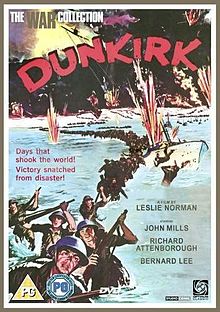- Dunkirk (film)
-
Dunkirk 
Directed by Leslie Norman Produced by Michael Balcon Written by J.S. Bradford (book)
Ewan Butler (book)
David Divine (screenplay)Starring John Mills
Richard Attenborough
Bernard LeeMusic by Malcolm Arnold Cinematography Paul Beeson Editing by Gordon Stone Studio Ealing Studios Distributed by MGM Release date(s) 10 September 1958 Running time 134 minutes Country United Kingdom Language English Dunkirk is a 1958 British war film directed by Leslie Norman and starring John Mills, Richard Attenborough and Bernard Lee.[1][2] It was based on two novels: Elleston Trevor's The Big Pick-Up and Lt. Col. Ewan Hunter and Maj. J. S. Bradford's Dunkirk.[3]
Contents
Plot
The film relates the story of Operation Dynamo, the evacuation of surrounded British and French troops from the beaches of Dunkirk. It does so principally from the viewpoints of two people: a newspaper reporter and a soldier.
Corporal "Tubby" Binns (John Mills), Lieutenant Lumpkin and their platoon return to their camp after blowing up a bridge, only to discover that their company has pulled out in the night, leaving them alone in France. One man and a truck have been left to wait for them, but he and Lumpkin are killed in a bomber attack, leaving Tubby in charge with no idea what the situation is. It is up to Tubby to keep his increasingly demoralised men on the move. Unsure of where to go, they dodge the advancing Germans and reach an Royal Artillery battery camp. They receive some food, before being ordered to go to Dunkirk, where the rest of the British Expeditionary Force and tens of thousands of French soldiers are gathering, hoping to be evacuated. Eventually, they get a lift in an RAF lorry and make it to the beaches.
Parallel to this action is the story of Charles Foreman (Bernard Lee), a pessimistic journalist who tries unsuccessfully to rouse his complacent readers before it is too late. With the Germans rapidly winning the Battle of France and threatening to destroy the Allied forces bottled up around Dunkirk, the British Admiralty commandeers all available civilian boats to aid the evacuation. Foreman insists on taking his motorboat Vanity himself, despite warnings of the danger. Others follow his example. An acquaintance, Holden (Richard Attenborough), a motor engineer and businessman self-satisfied with the profits he has made from the Phony War, does the same with some reluctance. However, as time goes by, his lack of commitment melts away.
The men on the beaches are subjected to regular aerial bombing and strafing. Tubby and his men get aboard a ship, only to have it blown up and sunk before it can depart.
After ferrying soldiers to the larger vessels, Foreman's boat is destroyed by a bomber. He survives and is picked up by Holden in the Heron. When Heron's motor seizes up, one of Tubby's men effects repairs, while Foreman and teenage crewman Frankie go ashore to survey the scene. Foreman and Tubby discuss who is responsible for the debacle. During a Sunday morning church parade, Foreman is fatally wounded in an attack by German aeroplanes. However, Holden, Tubby and his men make it safely back to Britain.
Production
The film's beach sequences were shot at Camber Sands in south east England.The scene where the bridge was blown during the early part of the film was on the River Medway at Teston Bridge, Teston in Kent.
Cast
- John Mills as Cpl. "Tubby" Binns
- Robert Urquhart as Pvt. Mike
- Ray Jackson as Pvt. Barlow
- Meredith Edwards as Pvt. Dave Bellman
- Anthony Nicholls as Military spokesman
- Bernard Lee as Charles Foreman
- Michael Shillo as Jouvet, a French reporter
- Richard Attenborough as John Holden
- Sean Barrett as Frankie
- Victor Maddern as Merchant seaman in pub, who resents Holden's attitude
- Maxine Audley as Diana Foreman, Charles' wife
- Bud Flanagan as Himself
- Chesney Allen as Himself
- Kenneth Cope as Lt. Lumpkin
- Denys Graham as Pvt. Fraser
- Barry Foster as Despatch Rider, who directs Tubby to the artillery camp
- Peter Halliday as Battery major in France
- Ronald Hines as Pvt. Miles (battery crew)
- Roland Curram as Pvt. Harper (battery crew)
- John Welsh as Staff colonel
- Lloyd Lamble as Staff colonel
- Cyril Raymond as General Viscount Gort, VC
- Eddie Byrne as Commander (Tough's Yard)
- Patricia Plunkett as Grace Holden, John's wife
- Michael Gwynn as Commander at Sheerness
- Michael Bates as Froome
- Harry Landis as Dr. Levy, a military doctor working on the beach
See also
Notes
- ^ Variety film review; March 26, 1958, page 6.
- ^ Harrison's Reports film review; August 23, 1958, page 134.
- ^ http://www.allmovie.com/work/dunkirk-90149
External links
- Dunkirk at the Internet Movie Database
- Dunkirk (film) at AllRovi
- Dunkirk (film) at the TCM Movie Database
Films directed by Leslie Norman 1950s The Night My Number Came Up (1955) · X the Unknown (1956) · The Shiralee (1957) · Dunkirk (1958) · Summer of the Seventeenth Doll (1959)1960s Categories:- British films
- English-language films
- Western Front of World War II films
- War films based on actual events
- 1958 films
- British drama films
- 1950s drama films
- Ealing Studios films
- Films directed by Leslie Norman
Wikimedia Foundation. 2010.
